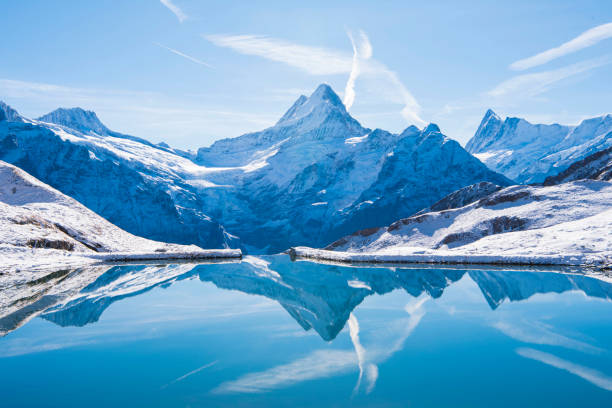A recent study published in the journal Nature reveals that the rapidly melting Antarctic ice is dramatically slowing down the flow of water through the world’s oceans. The marine food chain, the stability of ice shelves, and even the global climate might all be severely harmed by this decline in ocean flows.
The movement of denser water toward the sea floor, known as the “overturning circulation” of the seas, contributes to the global distribution of heat, carbon dioxide, oxygen, and essential nutrients.
The decline in deep-water ocean flows
According to the study, the deep ocean water flows from the Antarctic could decline by 40% by 2050.
This decrease is due to the fact that, as temperatures rise, freshwater from Antarctica’s melting ice enters the ocean, reducing the salinity and density of the surface water, and diminishing the downward flow to the sea’s bottom.
The bottom water circulation in Antarctica was little researched. Whereas earlier studies examined what would happen if a similar overturning circulation in the North Atlantic happens.
Up to the middle of this century, scientists used almost 35 million computation hours to run a range of models and simulations. They discovered that deepwater circulation in the Antarctic might deteriorate at a rate twice as fast as that of the North Atlantic.
Effects on global climate and the marine food chain
The study’s co-author and oceanographer at the University of New South Wales, Matthew England, predicts that the impact of meltwater on global ocean circulation will be significant. But it is not yet accounted for in the intricate models the IPCC uses to describe future climate change scenarios.
According to Steve Rintoul, a second research co-author, the Southern Ocean sustains roughly 75 percent of the world’s phytoplankton output, which forms the foundation of the food chain.
When the ocean turns, nutrients can rise to the surface. The circulation will slow down when the sinking near Antarctica slows. This will lessen the amount of nutrients recovered from the deep ocean to the surface.
The results of the study also imply that if the ocean’s upper layers became more stratified, it would not be able to absorb as much carbon dioxide, leaving more of it in the atmosphere.
Are slower ocean flows will leave us without enough air?
The ocean plays a crucial role in absorbing carbon dioxide (CO2) from the atmosphere, which helps to mitigate the effects of climate change.
However, the new study suggests that the rising Antarctic ice melt could decrease the ocean’s ability to absorb as much CO2 as it has in the past. This is because the melting ice adds fresh water to the ocean, which reduces the salinity and density of the surface water.
As a result, the surface water becomes more stratified, meaning that it is less likely to mix with deeper waters that contain higher levels of CO2.
This would leave more CO2 in the atmosphere, which could lead to further warming and exacerbate the effects of climate change. The impact of this reduced CO2 oceans’ absorption is not fully included in climate models. But it probably it will be significant.
If this is not bad news…
The study shows that warm water intrusions in the western Antarctic ice shelf would increase, but it did not look at how this might create a feedback effect and generate even more melting.
While the study doesn’t include disaster scenarios, it is still conservative in predicting the effects of melting Antarctic ice.
If the flow of water in the world’s oceans dramatically slows down, it could have disastrous effects on the global climate and the marine food chain. It could affect the entire ecosystem.

